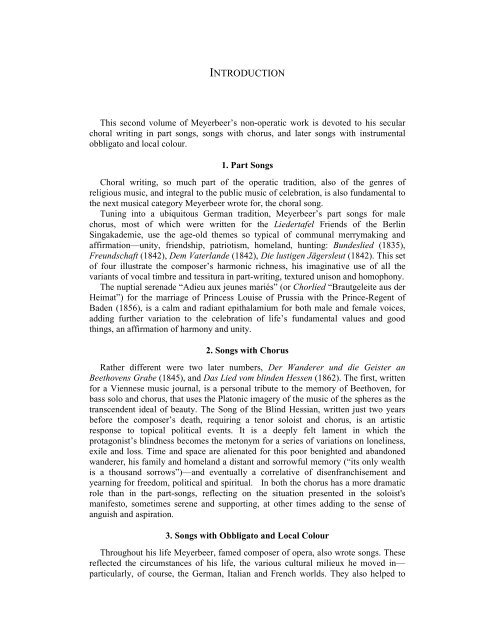Giacomo Meyerbeer: Choral Music and Songs - Cambridge ...
Giacomo Meyerbeer: Choral Music and Songs - Cambridge ...
Giacomo Meyerbeer: Choral Music and Songs - Cambridge ...
Create successful ePaper yourself
Turn your PDF publications into a flip-book with our unique Google optimized e-Paper software.
INTRODUCTION<br />
This second volume of <strong>Meyerbeer</strong>’s non-operatic work is devoted to his secular<br />
choral writing in part songs, songs with chorus, <strong>and</strong> later songs with instrumental<br />
obbligato <strong>and</strong> local colour.<br />
1. Part <strong>Songs</strong><br />
<strong>Choral</strong> writing, so much part of the operatic tradition, also of the genres of<br />
religious music, <strong>and</strong> integral to the public music of celebration, is also fundamental to<br />
the next musical category <strong>Meyerbeer</strong> wrote for, the choral song.<br />
Tuning into a ubiquitous German tradition, <strong>Meyerbeer</strong>’s part songs for male<br />
chorus, most of which were written for the Liedertafel Friends of the Berlin<br />
Singakademie, use the age-old themes so typical of communal merrymaking <strong>and</strong><br />
affirmation—unity, friendship, patriotism, homel<strong>and</strong>, hunting: Bundeslied (1835),<br />
Freundschaft (1842), Dem Vaterl<strong>and</strong>e (1842), Die lustigen Jägersleut (1842). This set<br />
of four illustrate the composer’s harmonic richness, his imaginative use of all the<br />
variants of vocal timbre <strong>and</strong> tessitura in part-writing, textured unison <strong>and</strong> homophony.<br />
The nuptial serenade “Adieu aux jeunes mariés” (or Chorlied “Brautgeleite aus der<br />
Heimat”) for the marriage of Princess Louise of Prussia with the Prince-Regent of<br />
Baden (1856), is a calm <strong>and</strong> radiant epithalamium for both male <strong>and</strong> female voices,<br />
adding further variation to the celebration of life’s fundamental values <strong>and</strong> good<br />
things, an affirmation of harmony <strong>and</strong> unity.<br />
2. <strong>Songs</strong> with Chorus<br />
Rather different were two later numbers, Der W<strong>and</strong>erer und die Geister an<br />
Beethovens Grabe (1845), <strong>and</strong> Das Lied vom blinden Hessen (1862). The first, written<br />
for a Viennese music journal, is a personal tribute to the memory of Beethoven, for<br />
bass solo <strong>and</strong> chorus, that uses the Platonic imagery of the music of the spheres as the<br />
transcendent ideal of beauty. The Song of the Blind Hessian, written just two years<br />
before the composer’s death, requiring a tenor soloist <strong>and</strong> chorus, is an artistic<br />
response to topical political events. It is a deeply felt lament in which the<br />
protagonist’s blindness becomes the metonym for a series of variations on loneliness,<br />
exile <strong>and</strong> loss. Time <strong>and</strong> space are alienated for this poor benighted <strong>and</strong> ab<strong>and</strong>oned<br />
w<strong>and</strong>erer, his family <strong>and</strong> homel<strong>and</strong> a distant <strong>and</strong> sorrowful memory (“its only wealth<br />
is a thous<strong>and</strong> sorrows”)—<strong>and</strong> eventually a correlative of disenfranchisement <strong>and</strong><br />
yearning for freedom, political <strong>and</strong> spiritual. In both the chorus has a more dramatic<br />
role than in the part-songs, reflecting on the situation presented in the soloist's<br />
manifesto, sometimes serene <strong>and</strong> supporting, at other times adding to the sense of<br />
anguish <strong>and</strong> aspiration.<br />
3. <strong>Songs</strong> with Obbligato <strong>and</strong> Local Colour<br />
Throughout his life <strong>Meyerbeer</strong>, famed composer of opera, also wrote songs. These<br />
reflected the circumstances of his life, the various cultural milieux he moved in—<br />
particularly, of course, the German, Italian <strong>and</strong> French worlds. They also helped to

















